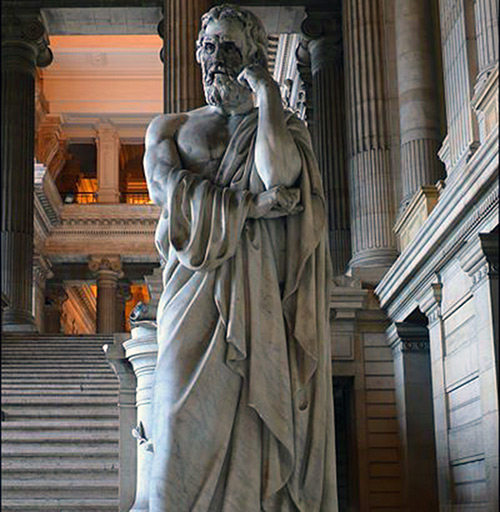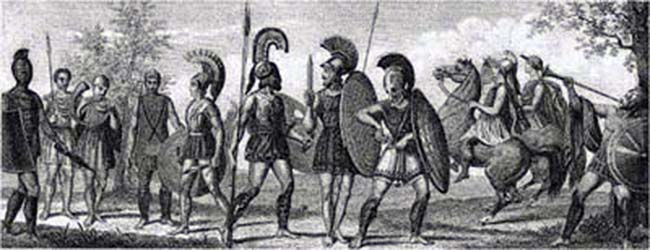According to the legend, from period of the king Lycurgus all existing Spartan laws were grounded. Lycurgus had conceived also political institutions, established after consulting with the Delphic oracle. Sparta was a city in Greece in which the form of the kingdom in the form of joint authority was preserved. Spartan political system was a combination of monarchy (kings), oligarchy (Gerousia) and democracy (ephoroi, ephors).
Oligarchy– Sparta always had two kings, the state was ruled by two hereditary kings of the Agiad and Eurypontid families (probably the two gens had great merits in the conquest of Laconia). King was succeeded by his the first born son after he came to power. Spartan kings had royal reputation, “first places in all”, holding the biggest portion of lands. They were the supreme commanders of the army. In peacetime they were responsible for the cult and to some legal issues. Both Kings had jointly decided.
The Gerousia had the highest authority in the Spartan state. The Gerousia was a council of elders (senate) which consisted of 28 elders (gerontocrats) and both kings who were members of The Gerousia by position. The elders were elected by the Assembly from among the oldest Spartan champions. These were the elders who turned 60 years old elected was for life, and later their mandate reduced to one year. Elders were inviolable and were not responsible for their actions before the law.



The Gerousia had advisory and legislative function, supervised the work of the government and preparing legislative proposals and other decisions which were to be submitted to the general assembly. They mostly made decisions on criminal matters (the death penalty, persecution). The Gerousia was able to start Procedure Code on its own initiative or at the ephors request (then ephores joinedthe gerousia as judges). The Gerousia was later recognized the power to indict and convict king. They vigilantly guarded the aristocratic state constitution.
Apella (National Assembly) in the beginning was a very important social authority. Members of the apella were all Spartiates who have reached the age of serving the army or after they have reached the age of thirtys. The Apella was legislature, that accepted and rejected laws. Apella elected ephores, elders and lower state officials.
Choices and decisions were carried out by acclamation in Sparta (people or Assembly had unanimously adopted a decision). Because one vote could block a voting, soon it was introduced to the system of voting divisions (depending whether the members were for or against a proposal they moved to the agreed position). Apella was held once pro month. Apella was initially summoned and presided by kings, but from the 5th century BC assembly elected 5 ephores in whose hands was executive authority convening the meeting itself and the management of its operations. Apella was held over the slopes of the Taygetus, where was a good acoustics and shelter from the wind.
Ephors were supervisors. There were 5 and they were elected from five tribal communities. In the beginning they had a king and the gerousia supervisory role and prevented strict control of power of the few. The oldest of five ephors was magistrate eponymos. Their mandate lasted a year and each year they elected a new ephors. From the 5th century they had an executive role of their Assembly decision and could call a meeting and the gerousia and made suggestions. They had the right to make the final decision if the two kings could not agree.



They had the legislative power that enabled them to accuse anyone (even kings). Their supervisor role amplified so much during the time that it destroyed the prestige and authority of kings. Ephors were able to control the private life of the monarch and limited their powers in command of the army, because two ephores accompanied the king to war. They started wars and assembled the peace. They were responsible for the upbringing of the youth were at the forefront of the Spartan diplomacy. They had a secret police (Crypteia– was established in the 5th century. BC in order to control helots), which was monitored by the Lacedaemonian, Spartiates, helots and Perioikoi communities. Ephors had numerous officials under its administration: monitoring of physical activity, supervision Spartan kitchen, market surveillance, control of the private life of women and others.
Peloponnesian alliance– Spartans in 6th century BC organized the powerful Peloponnesian alliance, Simah, in which Corinth, Epidaurus, Megara, Aegina and other cities in the Peloponnese and around it joined. The members of the Peloponnesian League were autonomous. They were committed only in the case of war against a common enemy to give a certain number of soldiers and recognize the Spartans supreme military command. Assemblies allies were held in Sparta.
